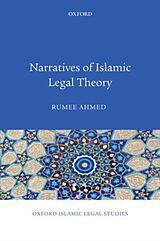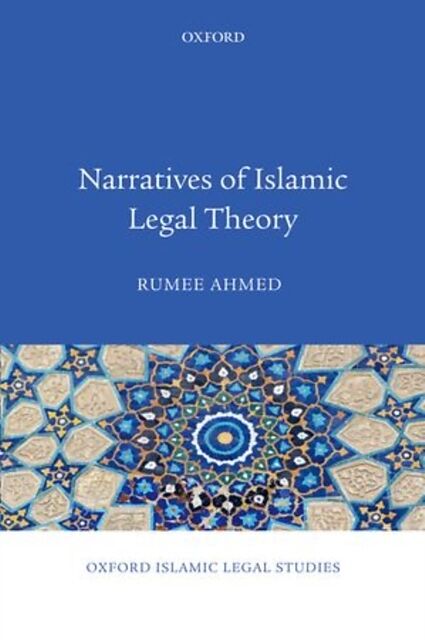Narratives of Islamic Legal Theory
Einband:
Fester Einband
EAN:
9780199640171
Untertitel:
Englisch
Genre:
Internationales Recht
Autor:
Rumee Ahmed
Herausgeber:
Oxford Academic
Anzahl Seiten:
192
Erscheinungsdatum:
15.03.2012
ISBN:
978-0-19-964017-1
Zusatztext This book is absolutely first-rate and it is difficult for me to praise this book too highly. Informationen zum Autor Rumee Ahmed is Associate Professor of Islamic Law in the Department of Classics, Near Eastern and Religious Studies at the University of British Columbia, Vancouver. He received his doctorate from the University of Virginia in Religious Studies, in the Islamic Scripture, Interpretation and Practice program. His research interests include Islamic law, theology, legal theory, and Qur'an interpretation. Klappentext In this book Rumee Ahmed shatters the prevailing misconceptions of the purpose and form of the Islamic legal treatise. Through a subtle interpretation of the work of major Islamic jurists, he reveals how the moral teachings of Islam were translated into a legal context in the critical, formative period of Islamic law. Zusammenfassung In this book Rumee Ahmed shatters the prevailing misconceptions of the purpose and form of the Islamic legal treatise. Through a subtle interpretation of the work of major Islamic jurists, he reveals how the moral teachings of Islam were translated into a legal context in the critical, formative period of Islamic law.
This book is absolutely first-rate and it is difficult for me to praise this book too highly.
Autorentext
Rumee Ahmed is Associate Professor of Islamic Law in the Department of Classics, Near Eastern and Religious Studies at the University of British Columbia, Vancouver. He received his doctorate from the University of Virginia in Religious Studies, in the Islamic Scripture, Interpretation and Practice program. His research interests include Islamic law, theology, legal theory, and Qur'an interpretation.
Klappentext
In this book Rumee Ahmed shatters the prevailing misconceptions of the purpose and form of the Islamic legal treatise. Through a subtle interpretation of the work of major Islamic jurists, he reveals how the moral teachings of Islam were translated into a legal context in the critical, formative period of Islamic law.
Zusammenfassung
In the critical period when Islamic law first developed, a new breed of jurists developed a genre of legal theory treatises to explore how the fundamental moral teachings of Islam might operate as a legal system. Seemingly rhetorical and formulaic, these manuals have long been overlooked for the insight they offer into the early formation of Islamic conceptions of law and its role in social life. In this book, Rumee Ahmed shatters the prevailing misconceptions of the purpose and form of the Islamic legal treatise. Ahmed describes how Muslim jurists used the genre of legal theory to argue for individualized, highly creative narratives about the application of Islamic law while demonstrating loyalty to inherited principles and general prohibitions. These narratives are revealed through careful attention to the nuanced way in which legal theorists defined terms and concepts particular to the legal theory genre, and developed pictures of multiple worlds in which Islamic law should ideally function. Ahmed takes the reader into the logic of Islamic legal theory to uncover diverse conceptions of law and legal application in the Islamic tradition, clarifying and making accessible the sometimes obscure legal theories of central figures in the history of Islamic law. The book offers important insights about the ways in which legal philosophy and theology mutually influenced premodern jurists as they formulated their respective visions of law, ethics, and theology. The volume is the first in the Oxford Islamic Legal Studies series. Satisfying the growing interest in Islam and Islamic law, the series speaks to both specialists and those interested in the study of a legal tradition that shapes lives and societies across the globe. The series features innovative and interdisciplinary studies that explore Islamic law as it operates in shaping private decision making, binding communities, and as domestic positive law. The series also sheds new light on the history and jurisprudence of Islamic law and provides for a richer understanding of the state of Islamic law in the contemporary Muslim world, including parts of the world where Muslims are minorities.
Inhalt
Introduction; 1. From God's Speech to Islamic Law: Defining the Qur'an; The Miraculousness and Inimitability of the Qur'an; The Clear and the Ambiguous in the Qur'an (muhkamat wa mutshabihat); The Abrogating and the Abrogated (al-nasikh wa-al-manuskh); 2. Re-Creating the Prophetic Model: The Hadith as the Gateway to the Sunnah; Multiple-Chained Transmissions (mutawatir) and Well-Established (mashhur) Transmissions; The Single Transmission (al-khabar al-wahid); Abrogation of the Qur'an through the Sunna; 3. The Limits of Considered Opinion (ra'y): Analogy and Precedent; The Bedrock of Qiyas: Determining the Ratio Legis ('illa); Taqlid of the Mujtahid; Taswib of the Mujtahid; 4. Conclusion; APPENDIX; BIBLIOGRAPHY

Leider konnten wir für diesen Artikel keine Preise ermitteln ...
billigbuch.ch sucht jetzt für Sie die besten Angebote ...
Die aktuellen Verkaufspreise von 6 Onlineshops werden in Realtime abgefragt.
Sie können das gewünschte Produkt anschliessend direkt beim Anbieter Ihrer Wahl bestellen.
Loading...
Die aktuellen Verkaufspreise von 6 Onlineshops werden in Realtime abgefragt.
Sie können das gewünschte Produkt anschliessend direkt beim Anbieter Ihrer Wahl bestellen.
| # | Onlineshop | Preis CHF | Versand CHF | Total CHF | ||
|---|---|---|---|---|---|---|
| 1 | Seller | 0.00 | 0.00 | 0.00 |
